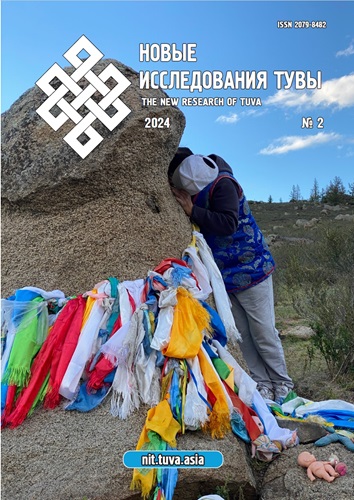Tuvan paroemias with a component-religion (against the background of other languages)
DOI:
https://doi.org/10.25178/nit.2024.2.3Keywords:
paroemia; religious name; Tuvan language; Buryat language; Ossetian language; Russian language; Swedish languageAbstract
The article examines Tuvan paroemias with religious names against the background of other languages, such as Buryat, Ossetian, Russian, Swedish. Similar paroemias are found in various languages, but the number and composition of proverbial units with religious names differ depending on the cultural and religious background of the speakers, as well as the availability of paremiography sources. The religious syncretism of Tengrian-Shamanism and Buddhism in Tuva has influenced the composition of religious names in proverbs. In addition to the lexemes “Burgan”, “Bogda” and “Lama”, “Ham” and “Aza” also function in Tuvan proverbs. However, Buddhism dominates the paremiological corpus under study in terms of quantity. From a structural point of view, syntactic parallelism prevails in the studied Tuvan proverbs.
Similarities between the paroemias in Tuvan and other languages analyzed are observed in the use of religious names, such as the names of priests and mythological figures, in their composition. Both lamas and shamans are evaluated negatively in Tuvan folklore. The same situation can be observed when evaluating priests in Ossetian and Swedish parables, and in Russian. Differences are manifested in the total number of paroemias with a religious component in each language, as well as in the number and composition of religious names themselves. They also differ in the predominance of certain syntactic patterns of paroemia, expressed in cultural attitudes and comparisons. For example, in Tuvan and Russian, the god — devil dichotomy is common, while in Buryat parables, the shaman-strongman distinction is more prevalent. In Ossetian parables, there is a prevalence of the priest-devil relationship, and in Swedish, the priest-mullah contrast. Buddhist beliefs are better reflected in Tuvan parables, while shamanistic beliefs predominate in Buryat.
References
Bazyrchap A.-Kh. O. and Kongu A. A. (2020) Evil Spirits as Viewed by the Tuvans. Vestnik NSU. Series: History and Philology, vol. 19, no. 3: Archaeology and Ethnography, pp. 134–146. (In Russ.). DOI: https://doi.org/10.25205/1818-7919-2020-19-3-134-146
Bredis, M. A. and Ivanov, E. E. (2022a) Linguoculturological commentary in polylingual dictionaries of proverbs. Russian Journal of Lexicography, no. 26, pp. 5–29. (In Russ.). DOI: https://doi.org/10.17223/22274200/26/1
Bredis, M. A. and Ivanov, E. E. (2022b) Proverbial factors in translating Tuvan proverbs in the light of normative and poly-lingual paremiography (as contrasted to Russian and English languages). New Research of Tuva, no. 1, pp. 17–36. (In Russ.). DOI: https://doi.org/10.25178/nit.2022.1.2
Bredis, M. A., Ivanov, E. E., Lomakina, O. V., Neliubova, N. Yu. and Kuzhuget, Sh. Yu. (2021) A lexicographical description of Tuvan proverbs: Principles, structure and an ethnolinguoculturological commentary as compared to European paremies. New Research of Tuva, no. 4, pp. 143–160. (In Russ.). DOI: https://doi.org/10.25178/nit.2021.4.11
Bredis, M. A., Lomakina, O. V., Borisova, A. S. and Lazareva, O. V. (2022) Numerical code of Tuvan linguistic culture in proverbs (as contrasted to a number of Turkic and Mongolian languages of the peoples of Russia). New Research of Tuva, no. 4, pp. 276–293. (In Russ.). DOI: https://doi.org/10.25178/nit.2022.4.20
Garri, I. R. (2020) Buddhism and Politics in Inner Asia. Oriental Studies, vol. 13, no. 1, pp. 8–16. (In Russ.). DOI: https://doi.org/10.22162/2619-0990-2020-47-1-8-16
Dashkovskii, P. K., Shershneva, E. A., Bicheldei, U. P. and Mongush, A. V. (2021) Religious Situation in the Republic of Tuva (Based on the Results of a Sociological Study). New Research of Tuva, no. 2, pp. 18–34. (In Russ.). DOI: https://doi.org/10.25178/nit.2021.2.2
Egorova, A. I., Kondakova, A. P. and Kuzhuget, M. A. (2020) Gender stereotypes in Tuvan proverbs and sayings. New Research of Tuva, no. 1, pp. 19–34. (In Russ.). DOI: https://doi.org/10.25178/nit.2020.1.2
Zinovieva, E. I. and Alyoshin, A. S. (2023) Tuvan paroemias of comparative semantics with the component сөс as compared to foreign language material. New Research of Tuva, no. 3, pp. 21–35. (In Russ.). DOI: https://doi.org/10.25178/nit.2023.3.2
Ivanov, E. E. (2023) Linguoculturological commentary in the Tuvan-Russian-English Paremiological Dictionary. New Research of Tuva, no. 1, pp. 243–258. (In Russ.). DOI: https://doi.org/10.25178/nit.2023.1.14
Lamazhaa Ch. K. (2021) Tuva as a limitrophe zone: language, religion and people’s identity. New Research of Tuva, no. 3, pp. 178–194. (In Russ.). DOI: https://doi.org/10.25178/nit.2021.3.14
Lamazhaa, Ch. K., Bicheldei, U. P. and Mongush, A. V. (2020) Tuvan Buddhist pilgrimage: from tradition to the faith. New Research of Tuva, no. 4, pp. 135–155. (In Russ.). DOI: https://doi.org/10.25178/nit.2020.4.10
Lomakina, O. V. and Mokienko, V. M. (2019) The Conceptual Dichotomy “God” — “Devil” in Russian Phraseology and Paroemiology (Against the Slavic Background). Tomsk State University Journal, no. 447, pp. 55–62. (In Russ.). DOI: https://doi.org/10.17223/15617793/447/7
Petrushevskaia, Yu. A. (2023) Universals in the Tuvan proverbial fund (as compared to modern European languages). New Research of Tuva, no. 1, pp. 259–279. (In Russ.). DOI: https://doi.org/10.25178/nit.2023.1.15
Seliverstova, E. I. (2022) Binary structures in Tuvan proverbs as a manifestation of the nationally marked vision of the world. New Research of Tuva, no. 1, pp. 115–130. (In Russ.). DOI: https://doi.org/10.25178/nit.2022.1.8
Skliarevskaia, G. N. (2012) The Vocabulary of Orthodoxy in Modern Russian: the experience of lexicological analysis and lexicographic description. Vestnik NGU, vol. 11, no. 9, pp. 36–40. (In Russ.).
Teliia, V. N. (2004) Cultural and linguistic competence, its high probability and deep intimacy in the units of phraseological composition of the language. In: Cultural layers in phraseological units and in discursive practices / ed. by V. N. Teliia. Moscow, Yazyki slavianskoi kul'tury. 344 p. Pp. 19–30. (In Russ.).
Khomushku, A. M. (2011) The social role of the shaman and lama in the traditional Tuvan culture. Mir nauki, kul'tury, obrazovaniia, no. 5 (30), pp. 396–398. (In Russ.).
Khomushku, O. M. (2010) Transformation of pre-Buddhist archetypes in the process of their interaction with Buddhist concepts in the worldview of the peoples of the Sayano-Altai. In: Tuvan writing and the issues of the study of scripts and written monuments of Russia and the Central Asian region. Materials of the international scientific conference dedicated to the 80th anniversary of Tuvan writing: in 2 parts / ed. by K. A. Bicheldei. Abakan, Khakasskoe knizhnoe izdatel'stvo. Part II. 280 p. Pp. 260–267. (In Russ.).
Published
How to Cite
For citation:
Zinovieva E. I., Alyoshin A. S. and Tskhovrebov A. S. Tuvan paroemias with a component-religion (against the background of other languages). New Research of Tuva, 2024, no. 2, pp. 40-60. (In Russ.). DOI: https://doi.org/10.25178/nit.2024.2.3
Issue
Section
Copyright (c) 2024 Журнал "Новые исследования Тувы" (составление)

This work is licensed under a Creative Commons Attribution-NonCommercial 4.0 International License.

Author(s) license holder(s) grant rights for their work to the journal (grantee of a license) under the simple non-exclusive open license in accordance with Art. 1286.1 «Open license for a research work, work of literature or fine arts», Civil Code of the Russian Federation.
New Research of Tuva publishes articles under the Creative Commons Attribution-NonCommercial license (CC BY-NC).
Since it is an open license, author(s) reserve the right to upload the article to their institutional repository, submit it to another journal (if it allows republications), or republish it on their own website (in full, or in part).
However, several conditions apply here:
a) The republished version must always contain the name(s) and affiliation(s) of the author(s), the original title and the hyperlink to the original version on the New Research of Tuva website;
b) It must be in open access, free of charge, and no category of readers must be in any way whatsoever advantaged over general readership.
c) should the contribution be submitted elsewhere by its author(s) without substantial modification (30% or more of original text unchanged), the body of the article should contain a disclaimer that the original version was published in New Research of Tuva (with a link to the respective page)
The CC-BY-NC is a non-revocable license which applies worldwide and lasts for the duration of the work’s copyright.











